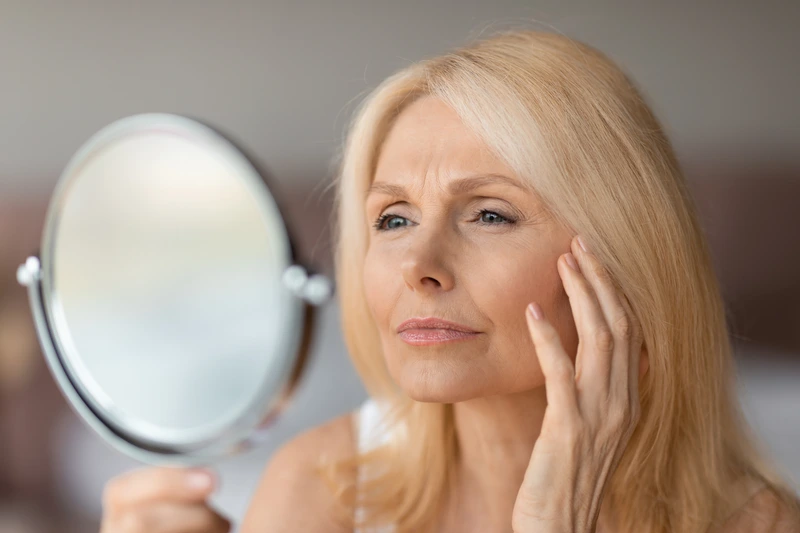Every woman experiences menopause differently. Most women go through the menopause transition between the ages of 45 and 55. The years of the menopause transition leading up to menopause are called perimenopause, and menopause occurs once a woman has gone one year without a period.
Hot flashes, night sweats, and mood changes are often thought of as the top symptoms associated with menopause. However, the list goes well beyond three, with many symptoms influencing one another. The following are the most common menopause symptoms and changes women may experience starting in their 40s or 50s.
Vasomotor Symptoms Related to Menopause
Hot Flashes
Hot flashes are perhaps the most widely recognized symptom associated with menopause, affecting approximately 80% of women. Hormonal fluctuations during the menopause transition are believed to reduce the range of normal core body temperature.(1) During a hot flash, women may suddenly feel overheated, start sweating, and notice skin redness. Some women may experience a few hot flashes a day, while others have reported having up to 20.
Night Sweats
Like hot flashes, night sweats are a common vasomotor symptom experienced during menopause. Night sweats, characterized by bouts of excessive nighttime sweating, are often reported as more bothersome than daytime hot flashes.(1)
Menopause Symptoms Related to Mental Health
Mood Swings
Drops in estrogen can cause significant changes in mood, including feelings of sadness or irritability. Research shows that women in their reproductive years who are prone to mood shifts before their period or after childbirth may be more susceptible to depression during perimenopause.(2)
Depression
Fluctuations in estrogen and progesterone can increase the risk of depression during the menopause transition. A study found that perimenopausal women were 40% more vulnerable to depression than premenopausal women.(3)
Anxiety
Stress, hormonal changes, and sleep disturbances can all heighten anxiety during the menopause transition. Even women without a history of anxiety are at an increased risk of emotional symptoms during this phase of life. Research has also shown a link between the severity of anxiety disorders and the intensity of menopause symptoms.(4)(5)
Panic Disorder
Women may develop panic disorder during perimenopause, particularly if they are prone to anxiety. Those who experience panic disorder during their reproductive years may find that symptoms increase during the menopause transition. Other menopausal symptoms like hot flashes or an irregular heartbeat may present similarly to a panic attack.(4)
Sleep Issues Related to Menopause
Sleep Problems
Psychological and vasomotor symptoms can disrupt sleep, making it difficult to fall asleep and causing wakefulness in the middle of the night. Many women also experience insomnia. About 40% to 60% of women experience sleep problems during menopause.(2)
Fatigue
Stress, sleep issues, and hormonal changes can impact daytime functioning and energy levels, leaving women feeling physically and mentally exhausted. Fatigue is one of the most common symptoms of menopause.(6)
Physical Changes During Menopause
Weight Gain
Approximately 60% to 70% of menopausal women experience weight gain. Declining hormone levels lead to a decrease in lean muscle mass and an increase in visceral fat, a type of abdominal fat that develops around essential organs. Between the ages of 50 and 60, women gain an average of approximately 1.5 pounds (lbs) annually.(7)
Dry Skin
Collagen is a protein produced by the body that strengthens the skin and keeps it moist. Women lose a significant amount of collagen during and after menopause. As skin loses strength and elasticity, it can start to dry out.(8)
Acne
Menopausal acne is caused by an imbalance in estrogen and androgen production. Androgens are a group of sex steroid hormones that includes testosterone. Hormone fluctuations can cause adult female acne (AFA), which may include whiteheads, pustules, or cysts. Over 26% of women between the ages of 40 and 49 are affected by acne.(9)
Hair Loss
Imbalances in estrogen and androgens may also lead to menopausal hair loss. Known as androgenetic alopecia or female pattern hair loss (FPHL), this condition typically causes hair thinning at the front of the scalp, although it usually doesn’t involve a receding hairline.(9)(10)
Increased Hair Growth
While some women may experience hair loss during menopause, others may notice mild body hair growth. Although body hair growth is considered a normal part of aging, rapid or excessive hair growth (hirsutism) could indicate an underlying health condition.(11)
Changes in Fingernails
Over time, fingernails lose their cholesterol sulfate content, which helps maintain their strength. As a result, nails become weaker. Postmenopausal women are at an increased risk of developing brittle nails.(12)

Neurological Symptoms Related to Menopause
Dizziness
A lesser-known menopausal symptom is dizziness. Research has shown a link between hormonal changes during menopause and disruptions in the bodily systems that regulate balance. Women may experience lightheadedness or bouts of disorientation, which can be exacerbated by elevated anxiety levels during menopause.(13)
Vertigo
Similar to dizziness, vertigo becomes more common during menopause. Women may experience hormonally mediated vertigo, which is influenced by hormonal changes; benign paroxysmal positional vertigo (BPPV), an inner ear disorder that causes short episodes of dizziness; or Meniere’s disease, characterized by dizziness, ear ringing, and pressure in the ear.(13)
Brain Fog
Menopause brain fog refers to cognitive changes in memory, attention, and focus that occur during a woman’s menopausal years. Symptoms are usually mild and may include difficulty remembering names, trouble concentrating on tasks, or misplacing items.(14)
Headaches and Migraines
Research suggests that menopausal women are most prone to migraines and tension-type headaches (TTH) compared to other types of headaches. Migraines may be more severe during perimenopause but typically lessen after menopause.(15)(16)
Nerve Pain
The lumbar discs in the lower back begin to deteriorate at a faster rate in women after menopause. This breakdown can place pressure on the surrounding nerves, causing neuropathic pain.(17)(18)
Urinary and Vaginal Symptoms Related to Menopause
Genitourinary syndrome of menopause (GSM) is a collection of urinary and vulvovaginal symptoms that affect women during menopause.(19)
Vaginal Dryness
Vaginal dryness is strongly associated with GSM. One study published in Climacteric found that, among 747 menopausal women between the ages of 40 and 55, 64% reported vaginal dryness as the most common symptom.(20)
Urinary Incontinence
Some menopausal women experience bladder leaks. Urinary incontinence is a pelvic floor disorder (PFD) and a symptom of GSM. Bladder control issues are common during menopause and are believed to be influenced by drops in estrogen. However, experts are still working to understand the specific role hormones play in menopausal urinary incontinence, as opposed to aging or other health conditions.(8)(21)
Urinary Tract Infections
A combination of thinning vaginal tissue, decreased lubrication, and weakening of the urethra muscles can make menopausal women more vulnerable to urinary tract infections (UTIs). Recurrent UTIs are also common during this stage of life and are another symptom of GSM.(8)(19)(22)
GI Symptoms Related to Menopause
Bloating
Declining levels of estrogen and progesterone are believed to contribute to bloating and other gastrointestinal symptoms commonly experienced during menopause. One study found that symptoms of irritable bowel syndrome (IBS) were more severe in postmenopausal women compared to premenopausal women. Changes in sex steroid hormones during the menopause transition are believed to disrupt communication between the brain and the gut.(23)
Nausea
While nausea is not as common as other menopausal symptoms, it may occur in connection with dizziness, hot flashes, anxiety, or lack of sleep.
Indigestion
Abdominal pain, heartburn, bloating, and other gastrointestinal symptoms are common during perimenopause and are believed to be influenced by changes in estrogen and progesterone.(24)
Abdominal Cramps
Abdominal pain is a particularly distressing symptom of menopause. Some women may experience discomfort due to changes in hormones, along with additional symptoms like anxiety. Gastrointestinal issues are common during perimenopause, and women diagnosed with IBS may experience more severe abdominal cramping.(24)
Menstrual, Uterine, and Breast Changes Related to Menopause
Irregular Periods
Irregular periods are one of the earlier symptoms of perimenopause. Menstrual flow may be lighter or heavier. Bleeding may also last longer than normal.(8)
Uterine Fibroids
Uterine fibroids are benign growths that can cause abnormal bleeding. While not all women experience symptoms, symptomatic cases of uterine fibroids are more common during the menopause transition, with rates decreasing after menopause.(25)
Loss of Breast Fullness
Dense breast volume progressively decreases with age but more so during the menopause transition. This may cause the breasts to feel less full. One study found that the higher a woman’s dense breast volume was during their premenopausal years, the more dense breast volume they were likely to lose annually during perimenopause.(26)
Breast Pain
Hormone fluctuations may cause some women to experience breast pain during the menopause transition. This symptom may be more common during early perimenopause compared to late perimenopause.(27)
Sexual Health Symptoms Related to Menopause
Decreased Libido
For many women, sexual desire wanes during menopause. Hormonal changes, increased stress, and symptoms of GSM can all contribute to a lower sex drive. A study published in JAMA Internal Medicine found that the prevalence rate of decreased libido was approximately 27% in premenopausal women in the United States. This rate increased to approximately 52% in women who had experienced natural menopause.(28)
Painful Sex
As hormone levels dip, the inner lining of the vagina becomes thin and inflamed. The body’s natural ability to lubricate the vagina also decreases. This can cause pain during sex, a common menopause symptom known as dyspareunia. Vaginal itching, burning, and tightening are also common.(19)(29)
Cardiovascular Symptoms Related to Menopause
Irregular Heartbeat
A rapid or irregular heartbeat is a common yet under-researched symptom of menopause. Some research suggests that as many as 42% of perimenopausal women and 54% of postmenopausal women experience this symptom. Poor sleep, hot flashes, and psychological symptoms may be contributing factors, but further study is needed.(30)
Shortness of Breath
Research indicates a link between menopause and reduced respiratory function, which may cause breathing difficulties. Women may also experience shortness of breath in association with anxiety or panic disorder, along with other menopausal symptoms.(31)
Musculoskeletal Issues Related to Menopause
Joint Pain and Muscle Pain
A decrease in estrogen can increase inflammation, causing achy muscles and joints. Hormonal fluctuations during menopause may also affect the body’s immune cells and the communication of pain between neurons. Menopausal weight gain can also contribute to joint and muscle pain.(32)
Osteoporosis
Osteoporosis is a condition characterized by bone loss, which increases the risk of fractures. A significant function of estrogen is to maintain strong, healthy bones. When estrogen levels decrease during menopause, bones may weaken, making women more vulnerable to osteoporosis.(33)
Other Menopause Symptoms
Allergies
Allergies are multifaceted, and changes in female sex steroid hormones may contribute to their development. Based on studies examining the relationship between estrogen and allergic diseases suggest that the hormone is believed to influence respiratory function and immune system response, both of which play a role in asthma.(34)
Changes in Body Odor
Many women notice shifts in their natural body odor during perimenopause. Vasomotor symptoms like night sweats and hot flashes can increase sweating, which in turn feedsfeeding odor-producing bacteria.(35)
How to Treat Menopause Symptoms
Depending on the symptoms, certain dietary changes, mindfulness techniques, skincare treatments, or other lifestyle modifications may help reduce discomfort. Hormone replacement therapy (HRT) can also provide menopause symptom relief.
Unlike synthetic hormones, the chemical structure of bioidentical hormones closely resembles that of the body’s natural hormones. Localized HRT creams with tretinoin can help minimize fine lines and wrinkles on the face. Systemic estrogen and progesterone creams, patches, and pills can help alleviate hot flashes, mood changes, low energy, and vaginal dryness. Menopause isn’t defined by a single symptom, so having treatment options to address multiple symptoms simultaneously can help ease the transition into menopause.


